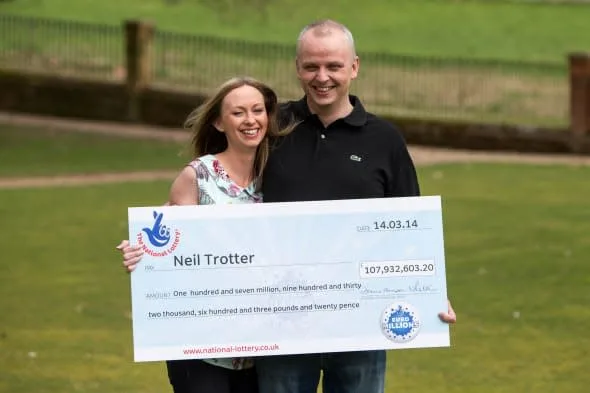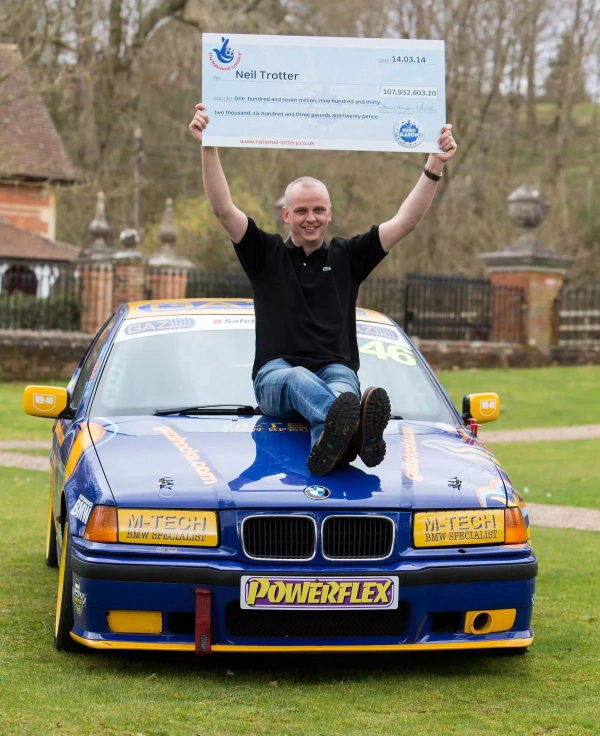
Neil Trotter’s £107 Million EuroMillions Win: What Happens After the Jackpot?
In 2014, Neil Trotter from Surrey, England, became one of the largest EuroMillions lottery winners, taking home a staggering £107.9 million. Trotter, a former mechanic, immediately splurged on expensive items, including luxury cars and a Grade II listed mansion with its own private lake. However, as time passed, Trotter found that the millionaire lifestyle was not as fulfilling as he had expected. What was once a dream come true has now turned into an experience of boredom and dissatisfaction.
The Initial Euphoria of Winning Big
At the time of his win, Neil Trotter was overjoyed and immediately began to indulge in his newfound wealth. He purchased luxury cars, including a Jaguar and a Porsche, and invested in a sprawling mansion in a picturesque part of Surrey. The lavish lifestyle seemed like a dream, and many people would have envied his success. However, Trotter’s excitement started to wear off as he realized that wealth and material possessions did not necessarily bring happiness.
In the early stages, it seemed as though every material desire was within his reach. But soon, Trotter discovered that while the initial euphoria was exhilarating, the novelty of his extravagant purchases wore off, and the daily routines began to feel empty. Luxury items that once seemed essential no longer brought the joy he had anticipated. The thrill of the purchase quickly faded, and Trotter realized that no amount of wealth could replace the satisfaction he had once found in a regular work routine.
Despite warnings from Camelot Group, the lottery operator, to not rush into spending, Neil wasted no time in splurging on everything he could imagine. In hindsight, he admits that the abundance of wealth came with a price—an overwhelming sense of aimlessness. Now, with the benefit of time and reflection, he understands that the transition from a life driven by necessity to one of excess is a far more complex and emotionally challenging process than he had ever imagined.
Realising That Money Doesn’t Solve Everything
Despite his extravagant purchases and a life of luxury, Neil soon came to terms with the fact that wealth alone could not provide lasting satisfaction. “The transition from needing to work to doing nothing all day was quite strange to adjust to,” said Trotter. What had seemed like an endless paradise began to feel like a trap, with boredom settling in as his constant companion. Trotter now admits that sitting at home, watching television all day, quickly became tiresome.
This sense of monotony eventually overshadowed the excitement of luxury living. Trotter’s once bustling schedule filled with work and social obligations was replaced with idle time that stretched on endlessly. No longer constrained by financial worries, he found himself questioning the purpose of his daily existence. The lavish home, the cars, and the designer clothes were all part of a fantasy that, in the end, couldn’t keep him entertained. He now believes that people often underestimate the importance of purpose and meaningful activity in life, regardless of how much wealth they possess.
The Struggle with a Purposeful Life After Winning
The abrupt shift from a working-class life to one of complete leisure was challenging for Neil Trotter. After years of working as a mechanic, the sudden lack of daily responsibilities left him feeling adrift. “I was used to having a job to go to every day, a sense of purpose,” he explained. Without a clear focus or goal, Trotter struggled to find meaningful ways to spend his time. His initial desire to relax and enjoy his newfound wealth was soon overshadowed by a sense of emptiness.
As Neil tried to adjust to his new lifestyle, he discovered that the key to finding happiness was not in continuing to accumulate wealth but in rediscovering his passions. He found that without goals to strive for, life began to feel purposeless. With no deadlines to meet and no work to attend to, the former mechanic found it increasingly difficult to maintain motivation. This realization was a wake-up call for Trotter, who had once thought that winning the lottery would bring him ultimate satisfaction.
What followed was a journey of self-discovery, as Trotter sought new outlets to keep his mind and body engaged. He reconnected with old hobbies, and over time, he found new interests that brought some meaning back into his life. But the process of reinventing himself was slow, and the struggle to adapt continued for some time. Trotter soon learned that adjusting to a life of leisure requires much more than just financial freedom—it requires mental and emotional flexibility as well.
The Search for New Passions
After experiencing the downside of having too much free time, Trotter began to search for new interests and hobbies to fill the void. He returned to one of his old loves – racing. Trotter had always enjoyed motorsports, and his winnings allowed him to indulge in this passion once again. He found that racing brought him a sense of excitement and purpose, offering a much-needed distraction from the monotony of daily life. While his mansion and lake provided a serene environment, they no longer held the same allure as they once did.
This return to racing provided Trotter with a renewed sense of excitement. It was an outlet where he could feel the rush of adrenaline once more, something he had craved since stepping away from the workforce. The thrill of the sport reminded him of the days when life felt more dynamic and less predictable. He realised that, much like his previous job, racing brought structure and challenge to his life, something he had sorely missed in the absence of a daily routine.

The Reality of Winning Big: A New Perspective
Over time, Neil Trotter came to understand that while winning a life-changing sum of money can offer many material rewards, it does not automatically guarantee happiness. For many, the idea of having unlimited wealth may seem like the ultimate goal, but as Trotter’s story shows, money alone cannot replace a sense of fulfillment. Despite all his riches, Trotter found himself grappling with feelings of boredom and dissatisfaction. The transition to a life of luxury was not as glamorous as he had imagined, and he now encourages others to consider the complexities of such a shift.
The story of Neil Trotter serves as a powerful reminder that happiness does not come from wealth alone. His experience highlights the fact that money can provide temporary excitement, but true fulfillment comes from meaningful relationships, pursuing passions, and finding a sense of purpose in life. Trotter’s journey from luxury to boredom to rediscovery serves as a cautionary tale for those who believe that money is the answer to all of life’s problems.
While Neil continues to live with his wealth, he has also learned the importance of balance. Now, he strives to maintain a lifestyle that brings both enjoyment and purpose, ensuring that his wealth supports his happiness rather than defining it. His story is a testament to the idea that life’s greatest rewards come not from external possessions but from the internal satisfaction of living authentically and with purpose.
Finding Balance in the Chaos
As Neil Trotter continues to adjust to his new reality, he is learning to find a balance between enjoying his wealth and pursuing meaningful activities. His journey is a reminder that wealth is not a cure-all for life’s challenges and that true happiness often lies in the pursuit of passions, relationships, and personal growth. For Trotter, the experience of winning £107.9 million has taught him valuable lessons about what really matters in life, and he continues to evolve in his quest for purpose and satisfaction.
